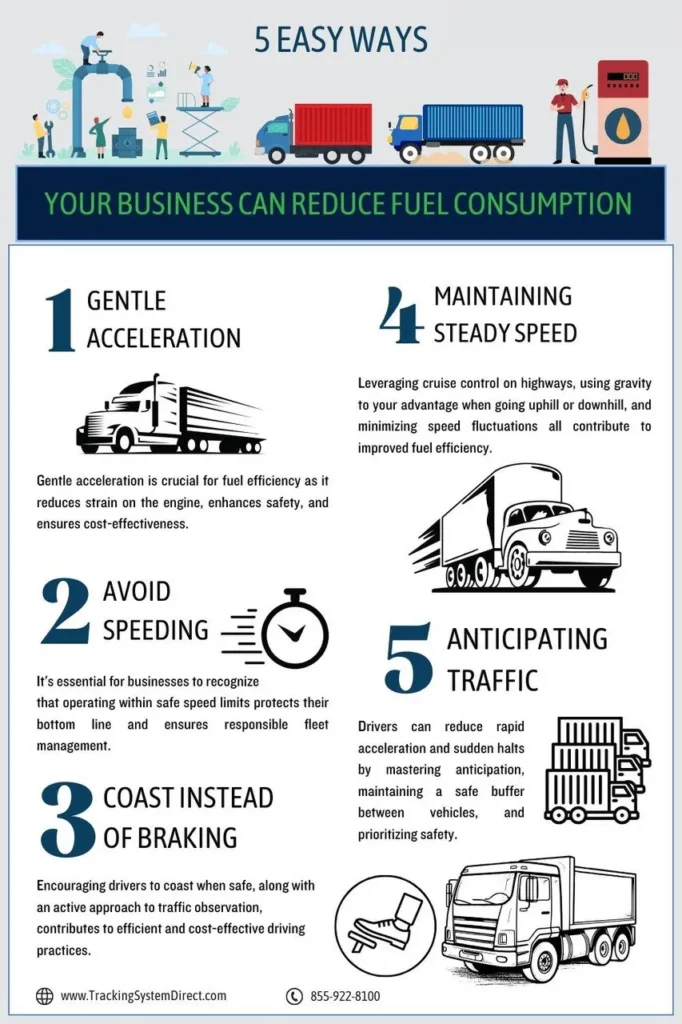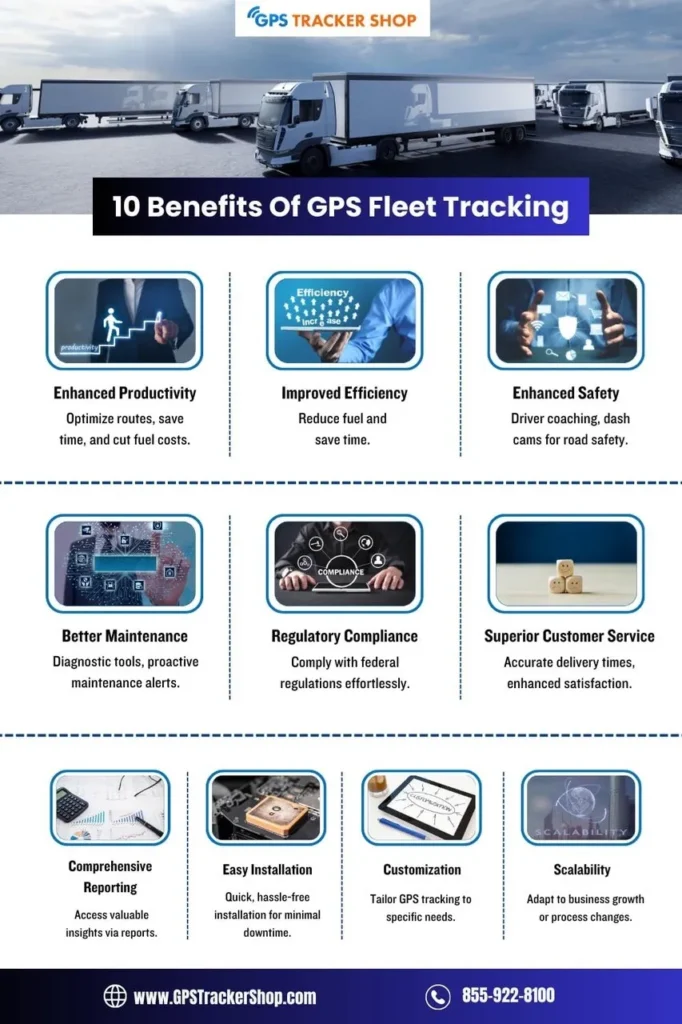Table of Contents
Every day, logistics managers face a silent enemy eating away at their profits: inefficiency, theft, and non-compliance. These threats don’t just cost money—they damage reputations, strain customer relationships, and leave businesses vulnerable to risks they can’t always see coming. But here’s the truth: you don’t have to live in fear. There’s a solution that transforms these challenges into opportunities for growth, savings, and trust—GPS tracking.
In this guide, you’ll discover how GPS technology is revolutionizing logistics by addressing the biggest pain points head-on. By the time you finish reading, you’ll know exactly how to leverage GPS tracking to protect your assets, streamline operations, and position your business as a leader in the industry. Here’s what we’ll cover:
- Boosting Operational Efficiency: Learn how real-time tracking and route optimization cut fuel costs, reduce delivery times, and maximize fleet performance.
- Stopping Theft in Its Tracks: Uncover how GPS devices deter criminals, recover stolen goods, and even shut down entire criminal operations.
- Ensuring Compliance and Building Trust: Find out how GPS data keeps you on the right side of regulations while delivering unmatched transparency to customers.
By the end of this article, you’ll have a clear roadmap for turning GPS tracking into your secret weapon—and making it the centerpiece of your brand’s story. Let’s get started.
Enhancing Operational Efficiency in Logistics

What if you could cut fuel costs by 20% while slashing delivery times in half? Sounds impossible, right? But here’s the secret logistics managers don’t want their competitors to know: GPS tracking is the ultimate game-changer for operational efficiency. And yes, companies like Fleet1st have been helping companies reduce anywhere from 20-30% on fuels costs and other inefficiencies that can all be detected with GPS vehicle trackers.
The logistics industry thrives on precision—and without real-time visibility into your operations, you’re essentially flying blind. That’s why integrating GPS technology into your logistics system isn’t just an upgrade; it’s a necessity. Let’s dive into two key areas where GPS transforms chaos into control.
Real-Time Tracking and Route Optimization
Let us paint a real life scenario many small businesses deal with daily. One of your trucks carrying critical raw materials gets stuck in traffic due to unexpected road closures. Meanwhile, your warehouse management team scrambles to reroute other shipments, customers demand updates, and deadlines loom closer. Stressful? Absolutely. Avoidable? 100%.
How GPS Enables Real-Time Location Tracking
With GPS-enabled devices, every vehicle and shipment becomes visible on a live map. No more guessing games about “where’s my truck?” or “when will it arrive?” Instead, you get instant access to real-time location data, empowering you to make smarter decisions faster. For example, imagine being able to notify customers automatically when their order is delayed—or better yet, rerouting it seamlessly to ensure timely delivery.
Benefits of Route Optimization
Route optimization takes things a step further. By analyzing traffic patterns, weather conditions, and even driver behavior, GPS tools help create the most efficient routes possible. The result? Fewer miles driven, reduced fuel consumption, and shorter delivery times—all of which add up to significant savings for your business logistics.
- Fuel Savings: Studies show that optimized routing can reduce fuel expenses by up to 15%. Imagine what that means for your bottom line.
- Faster Deliveries: Customers demand speed, and GPS ensures you deliver—not just on time, but ahead of schedule.
Fleet Management and Resource Allocation

Ever wondered why some fleets run like clockwork while others feel like they’re falling apart? The difference often comes down to one thing: accurate data. And guess what provides that? Yep—you guessed it: GPS tracking.
Monitoring Fleet Performance and Driver Behavior
GPS devices do more than track locations; they monitor everything from engine health to driver habits. Are drivers idling too long? Taking inefficient routes? Speeding? With GPS insights, you can address these issues head-on, improving both safety and performance. Plus, knowing exactly how your fleet operates allows you to hold drivers accountable and reward those who excel.
Streamlining Resource Allocation
Accurate data also means smarter resource allocation. Need to schedule maintenance for a specific truck? GPS alerts you before problems arise, preventing costly breakdowns. Want to maximize vehicle usage? Use GPS reports to identify underutilized assets and redistribute them effectively. These small tweaks lead to big wins over time.
What’s Next?
By now, you’re probably thinking, “Okay, this sounds great—but how do I translate all this into a website that sells?” Don’t worry—we’re just getting started. In the next section, we’ll explore how to position GPS tracking as the ultimate solution for demand planning and warehouse management. You’ll learn how to craft messaging that resonates with logistics managers and turns visitors into loyal customers.
Improving Security and Accountability
What keeps logistics managers up at night? Two words: theft and compliance. Whether it’s a stolen truck loaded with valuable goods or a driver skirting hours-of-service rules, these risks can cripple your business. But here’s the good news: GPS tracking doesn’t just optimize routes—it protects your assets and ensures transparency every step of the way.
Let’s break down how GPS technology helps you fight back against theft and build trust with customers through accountability.
Theft Prevention and Recovery
The Role of GPS in Deterring Theft
Imagine waking up to find that one of your delivery trucks has vanished overnight. It’s every logistics manager’s nightmare—but it happens more often than you’d think. According to industry reports, cargo theft costs businesses billions annually. The solution? A GPS-enabled anti-theft system that turns thieves’ plans into dust.
GPS vehicle trackers act as silent guardians, providing real-time location updates even when automobiles are off the grid. Thieves might steal your truck, but they can’t outrun satellite technology. And here’s the kicker: Many portable GPS trackers come equipped with geofencing features, which alert you instantly if a vehicle leaves its designated area. This alone is enough to deter most criminals.
Aiding Recovery of Stolen Goods
Here’s proof that GPS tracking doesn’t just deter theft—it actively helps recover stolen goods and bring criminals to justice. In a recent case out of Gwinnett County, Georgia, police arrested Larry Dobbs, 46, for allegedly running a chop shop after a GPS tracker on a stolen mini excavator led them straight to his doorstep.
According to a press release from the Gwinnett County Police Department (GCPD), officers were dispatched on November 26 following a report of a stolen vehicle equipped with a GPS tracker. When they arrived at the location provided by the tracker—846 Rockbridge Way in Norcross—they spotted the stolen excavator right from the street. But that was only the beginning.
After obtaining a search warrant, detectives uncovered a treasure trove of illegal activity at the residence. They recovered over $100,000 worth of stolen property , including two excavators, an SUV, three vehicles with altered VINs, two motorcycles, a trailer, a stolen handgun, and even illegal drugs like Fentanyl and Oxycodone. Without the GPS tracker, these items might never have been found, and the suspect could have continued his operations unchecked.
Larry Dobbs now faces multiple charges, including operating a chop shop, felony theft, possession of a firearm by a convicted felon, and more. He’s currently behind bars in the Gwinnett County Jail, thanks in large part to the power of GPS technology.
This case isn’t just about recovering stolen goods—it’s about shutting down entire criminal enterprises. For logistics managers and fleet operators, this underscores the importance of equipping vehicles with GPS devices. Not only does it protect your assets, but it also aids law enforcement in cracking down on organized crime.
Ensuring Compliance and Transparency
Using GPS Data for Regulatory Compliance
In an era of strict regulations, staying compliant is non-negotiable. Take hours-of-service (HOS) rules, for instance. Drivers must adhere to specific limits on driving time to prevent fatigue-related accidents. Non-compliance? Fines, lawsuits, and damaged reputations.
GPS tracking simplifies compliance by automatically logging driver activity, including start/stop times, rest breaks, and mileage. No more manual record-keeping or guesswork. For example, the Konnect OBD2 GPS tracker can record speed, harsh breaking, travel history, and vehicle diagnostics. This not only keeps you on the right side of the law but also boosts operational efficiency. Logistics managers love this because it reduces administrative headaches while ensuring safety.
Building Trust Through Transparent Shipment Tracking
Customers demand transparency—and GPS delivers. Imagine sending clients live updates about their shipment’s exact location, estimated arrival time, and even temperature conditions (for perishable goods). Suddenly, you’re not just a service provider; you’re a trusted partner.
For example, cold chain logistics) companies use GPS to monitor refrigerated trucks carrying sensitive materials like vaccines or fresh produce. If temperatures deviate from safe levels, alerts trigger immediate corrective actions. This level of visibility builds confidence and loyalty among your clientele.
Addressing Privacy Concerns
Of course, with great power comes great responsibility. Some drivers and stakeholders may worry about privacy issues related to GPS monitoring. To address these concerns, emphasize ethical practices. Clearly communicate how data will be used—for safety, efficiency, and security—not surveillance. Transparency breeds trust, both internally and externally.
You now understand how GPS enhances security and accountability—but there’s still more ground to cover. In the next section, we’ll explore how GPS technology supports demand planning and improves warehouse management systems. You’ll discover how to position your website as the go-to resource for solving these critical challenges.
Final Thoughts: The Transformative Role of GPS Tracking in Logistics
Let’s take a step back and look at the big picture. What started as a simple tool for navigation has evolved into a game-changing force that’s reshaping the entire logistics industry. GPS tracking isn’t just a “nice-to-have” anymore—it’s the backbone of modern logistics operations. From enhancing operational efficiency to improving security, ensuring compliance, and building trust with customers, GPS technology is the secret weapon every logistics manager needs in their arsenal.
Think about it:
- You can now track shipments in real-time, optimize routes to save fuel and time, and recover stolen goods before they disappear forever.
- Fleet managers have the power to monitor performance, allocate resources smarter, and cut costs without sacrificing quality.
- Customers demand transparency, and GPS delivers—literally. With live updates and precise delivery windows, you’re not just meeting expectations; you’re exceeding them.
And let’s not forget the ripple effect. When you implement GPS tracking, you’re not just optimizing your business—you’re contributing to greener logistics by reducing fuel consumption and emissions. You’re also helping fight crime, as we saw in the Gwinnett County case where GPS led to the takedown of an entire chop shop operation.
The bottom line? GPS tracking transforms chaos into control, inefficiency into precision, and risk into reliability. For anyone designing a website to showcase GPS tracking technology, this is your chance to position it as the ultimate solution for every pain point in logistics. Whether you’re targeting warehouse management teams, third-party logistics providers (3PLs), or global supply chain leaders, the message is clear: GPS isn’t just part of the process—it is the process.
So, are you ready to create a site that doesn’t just sell GPS devices but revolutionizes how people think about logistics? The future of the industry is here—and it’s powered by GPS.


